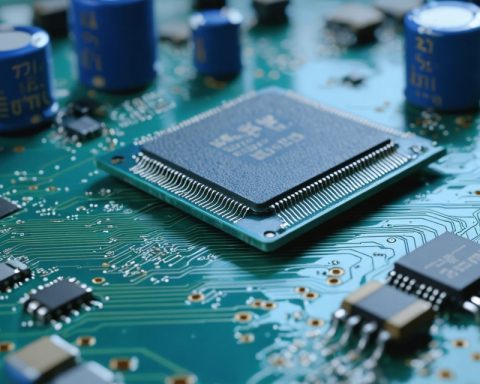The U.S. Army is set to transform its computing capabilities with a groundbreaking contract awarded to GSI Technology. This milestone signifies a major endorsement of GSI’s Associative Processing Unit (APU) and its innovative compute-in-memory architecture. This advanced technology allows data to be processed directly within memory, aiming to decrease power usage and latency while enhancing overall processing power.
The collaboration will focus on integrating GSI’s Gemini-II technology with artificial intelligence models to meet the Army’s specific edge computing requirements. Key elements of this project include analyzing operational hurdles, fine-tuning the Gemini-II framework, and determining critical performance benchmarks. Furthermore, GSI plans to evaluate and confirm AI algorithms that align with this platform, ultimately enhancing the Army’s operational effectiveness and situational intelligence.
GSI’s CEO, Lee-Lean Shu, emphasized the significant impact their technology could have on military operations, noting that the Gemini-II platform can greatly boost the Army’s operational effectiveness. The unique capacity to process data directly within memory addresses pressing needs in modern computing, particularly for applications that demand both high speed and efficiency.
In addition to military applications, GSI’s goal to develop 1-bit Large Language Models (LLMs) heralds prospects for sectors like autonomous navigation and mobile data processing. This contract reflects GSI Technology’s ambition to innovate in the realms of edge computing and AI, with a positive market response indicating strong potential for success in upcoming endeavors.
Transforming Military Operations and Beyond
The recent partnership between the U.S. Army and GSI Technology represents a pivotal moment not just for military computing, but also for the broader tech landscape and its implications on society and the environment. As the integration of advanced edge computing and artificial intelligence (AI) systems becomes paramount, military investments in such technologies may lead to significant advancements in civilian sectors as well.
In terms of societal impact, the advancements in compute-in-memory technology allow for faster and more efficient data processing, which can revolutionize fields from healthcare to logistics. For instance, in healthcare, quicker data accumulation and real-time analysis can facilitate faster diagnoses and improved patient outcomes. Additionally, the emphasis on AI algorithms tailored for real-time analytics could significantly enhance emergency services and disaster response frameworks.
However, with these advancements come potential environmental concerns. The shift towards energy-efficient computing is necessary, as the tech industry grapples with its carbon footprint. The Army’s focus on reducing power usage aligns with global initiatives aimed at sustainable technology. As such innovations proliferate, they could inspire other industries to adopt similar energy-efficient practices.
Looking forward, the trajectory of these developments suggests a fusion of military and civilian tech. Advances in AI and computing can lead to new economic opportunities, with startups and established firms seeking to harness both military-grade technology and the burgeoning fields of autonomous systems and intelligent data processing, thereby shaping economic landscapes across the globe.
Revolutionizing Military Computing: The U.S. Army Partners with GSI Technology
The U.S. Army is embarking on an ambitious journey to transform its computational abilities through a pioneering contract with GSI Technology. This deal highlights the Army’s commitment to enhancing its technological infrastructure, utilizing GSI’s Associative Processing Unit (APU) based on its cutting-edge compute-in-memory architecture. This approach significantly reduces power consumption and latency, while maximizing processing capabilities, heralding a new era for military computing.
Features of GSI’s Technology
1. Compute-in-Memory Architecture: This innovative technology allows for data processing directly within memory, which enhances speed and efficiency—crucial for applications involving large datasets and real-time analysis.
2. Gemini-II Technology Integration: The partnership will see the integration of GSI’s Gemini-II technology with artificial intelligence frameworks tailored to the Army’s edge computing needs. This fusion aims to address specific operational challenges by refining that technology to meet military requirements effectively.
3. AI Performance Optimization: GSI plans to meticulously analyze and validate AI algorithms that can be utilized dually within the military and civilian domains, enhancing both operational effectiveness and situational awareness.
Use Cases and Applications
– Military Operations: The primary focus lies in boosting operational efficiency, allowing soldiers to process vast amounts of information quickly in the field, thus enabling informed decision-making in real-time.
– Autonomous Navigation: The advancements in AI will potentially benefit autonomous systems, improving navigation and response capabilities in complex environments.
– Mobile Data Processing: GSI aims to leverage 1-bit Large Language Models to optimize data handling and processing on mobile platforms across various sectors, ensuring that data-driven insights are accessible anywhere.
Pros and Cons
Pros:
– Enhanced Efficiency: Streamlined processing within memory leads to faster computation times and reduced energy consumption.
– Real-Time Decision-Making: AI enhancements will facilitate quicker responses during military engagements and operational scenarios.
– Innovation in Civilian Applications: The development of AI and large language models extends potential commercial applications.
Cons:
– Security Concerns: As with any advanced technology, the integration of AI into military usage raises questions about cybersecurity and data integrity.
– Dependence on AI: Heavy reliance on artificial intelligence could lead to challenges if systems fail or are compromised.
Market Insights and Future Trends
GSI Technology’s collaboration with the U.S. Army represents a broader trend in military modernization, indicating a shift towards integrating AI and edge computing in defense systems. With increasing demand for advanced processing solutions, market analysts predict a significant growth trajectory for companies specializing in this technology.
Limitations and Challenges
While the promise of GSI’s technology is substantial, challenges remain, including the complexity of integrating new systems into existing military infrastructures and ensuring interoperability with legacy systems.
Conclusion
The contract between the U.S. Army and GSI Technology marks a critical step towards enhancing military computing capabilities through innovative technologies. As developments unfold, the implications of these advancements can reshape not only military operations but also extend to commercial sectors, paving the way for future innovations in edge computing and artificial intelligence.
For further insights on technology advancements and military applications, visit GSI Technology.


















